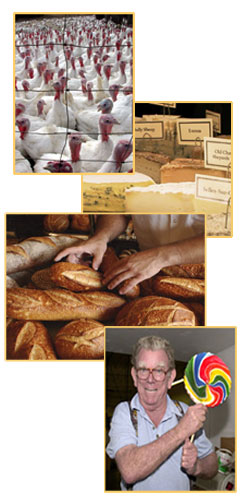
|
|
|
|
|
|||||||
|
|
|
|
|
|
|
|
|
||||
|
|
|
||||||||||
|
|
|
|
|||||||||
|
|
This series of live Webcasts explores the science and culture of cooking. Our guests include noted chefs, food chemists, and nutritionists, and we take field trips to investigate famous kitchens and farms! Thanksgiving Science: Turkey Wednesday, November 20, 2002 Why does a turkey continue to cook after it's out of the oven? How can you be sure to thoroughly cook the dark meat without drying out the white meat? Is stuffing really a good idea? How do you make the skin golden? Join us as we talk turkey with food expert and author Harold McGee. Join us as we go on a virtual tour of the Willie Bird Ranch, talk turkey with food expert Harold McGee, and cook with Red Herring Chef Marc Schoenfield. Find out the difference between turkeys and hens, discover why temperature is critical, and investigate different cooking methods: roasting, deep frying, barbecuing, and smoking. Sparkling Science: Champagne Saturday, December 28, 2002 Learn how sparkling wine is made, what makes it different from still wine, and where all those little bubbles come from! We'll reveal how to open a bottle without touching the cork, as well as the best way to keep the bubbles in the bubbly. Join our special guests, Stanford chemistry professor Dick Zare, and French enologist Michel Salgues, winemaker at Roederer Estates in California, as we explore the science of tiny bubbles. Crusty Science: Bread Saturday, January 18, 2003 What is yeast and what does it do to bread? How can you guarantee a crispy crust? Why are some breads sweet and some sour? Do you always have to knead it? Join us as we crunch our way through everything from our San Francisco sourdough to Injera and Pugliese. Breakfast Science: Coffee and Donuts Saturday, February 15, 2003 Nothing gets us going in the morning like coffee and donuts. Join us as we delve into the mysteries of the bitter and the sweet. Where does coffee come from? Is it a bean? A seed? How does roasting affect its flavor? Why do so many people drink it? And donuts: Where do they come from and why do they have a hole in the middle? We'll learn why the two taste so good together, and why we crave them in the morning. Moldy Science: Cheese Saturday, March 15, 2003 What is that hairy stuff on my cheese? Is it supposed to be runny? Creamy? Crumbly? How can anything that smells that bad taste that good? Come along as we explore the cool, dark world of cheese. Sweet Science: Candy! Saturday, April 19, 2003 How do they make jellybeans shiny? Can the color of a candy affect the way it tastes? Do candy factories really look like Willy Wonka's? Join us as we investigate the sweet world of sugar.
Having problems viewing the Webcast?
Enjoy these webcasts? Let us know what you think of them, and the Science of Cooking Website by filling out this short survey . We value your input. |
|

The Phyllis C. Wattis Webcast Studio is located inside the Exploratorium. Entrance to the event is included in the price of admission. See Directions and Hours & Admissions for more info." Stay connected! Subscribe to the Exploratorium E News. Learn about upcoming museum and Web events, new Web site features, special offers, and more! |
|
|
||
|
|
|
| - - - Science of Cooking - - - Webcasts - - - Ask the Inquisitive Cooks - - - |
|
|
|
|
© Exploratorium | Use Policy | Privacy Policy